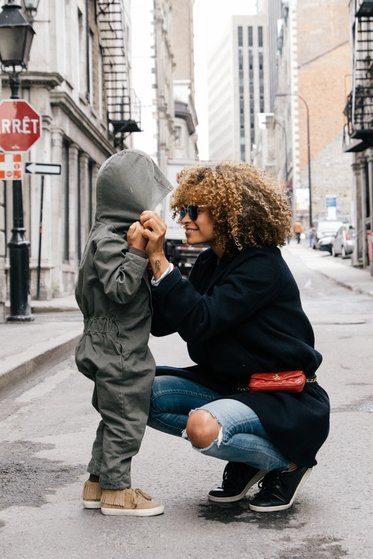|
Anxiety is an individual experience
Extreme anxiety can arise with no apparent reason in certain children, but usually a child is susceptible to specific situations or events. These can include a major life change such as moving to a new city or school, or changes at home such as the parent's separation or a new relationship. Other susceptibilities can be witnessing a distressing event, or being in an upsetting situation such as emotional abuse or bullying. If the child is different in some way such as being LGBTQ or having a visibly noticeable difference such as a birth mark, that can also trigger anxiety. However, we have all observed that what upsets one child has no effect on another child. What to look for? How can we tell if a kid is experiencing anxiety that is unhealthy? With young kids we tend to give a lot of tolerance for personality and individual character or for situations that are obviously difficult. Usually we can say, 'just give it some time and they will find their footing.' Or we can discuss the situation with them and then see if they outgrow a phase. There are things we can look out for such as sudden changes in behaviour that seem out of character or are not the usual growing pains. If a child has unexpected changes of their feelings, such as a happy child that is suddenly worried, guilty, angry or fearful this is something to observe closely. When the emotions do not shift naturally and seem to get stuck on only one 'channel,' that can point to a lack of adaptation and spontaneous response. Hopelessness and rejection can be signs of something deeper, and if left unaddressed may lead to more serious issues such as depression, a desire to self harm or even of suicide in later adolescence. Also, for older children, the use of drugs or alcohol, especially when they are alone can signal a need for soothing, coping and numbing out uncomfortable thoughts and feelings. It is also important to notice if they are complaining of physical symptoms like frequent headaches or stomachaches, if they have problems eating or sleeping, or have a general lack of energy. Take notice if they start to make odd or repetitive movements such as when they are playing or resting. It is good to observe as well if they start to avoid things that before they enjoyed or liked, if they are suddenly less social or interested in being with others. And if they show any signs that they are having trouble coping with regular activities and normal everyday challenges. What if I don't have a diagnosis of anxiety for my child? Observable signs and symptoms determine unhealthy anxiety in children. In older children they may also be able to provide their inner experience of physical symptoms as well as thoughts, imaginations and dreams. An official diagnosis can be difficult since behaviours such as shyness, anxiety nervousness, strange eating habits, and outbursts of temper can occur as a normal part of a child's development. It is important to be able to discern if they happen very often, last a long time, occur at an unusual age, or cause significant disruption to the child's and/or family's life. It can be reassuring to have medical tests and a diagnosis since a child is unable to fully express or understand their own symptoms and inner experience, but in some situations they may be too costly or unavailable. When there is a diagnosis and the doctor is doing tests, this can help to direct the course of action to take. With homeopathy however, there is no need for a specific diagnosis of anxiety, a serious concern is enough to warrant a trip to the homeopath. Then in collaboration with the parents, they can see if there is a general remedy to help with the stage and adaptation that the child is struggling with. In more serious cases when something is definitely wrong, it can be good to give a deeper, more individualized core remedy to help the child with all aspects of their life and to give them an opportunity for more healthy development and balance. Homeopathy is a completely natural approach and instead of prescribing medications or lengthy therapy, a few sessions can often determine the situation and resolve the issue or with the suggestion of a remedy or remedies this can help the child to naturally resolve their issue. By naturally adapting to their current situation a child can develop greater resilience, a stronger immune system, develop their individuality and reduce the level of toxicity or stress that medications may cause. ~ How does holistic treatment support healthy living? Why try homeopathy? Having a life long study in the principles of nature and healthy living, Lauren Trimble is happy to share her knowledge and experience. The art of retuning the body’s natural healing capacity & developing consciousness in a compassionate and gentle way is the gift that homeopathy brings to her current holistic practice. If you enjoyed this article find out more at Birdsong.
0 Comments
Your comment will be posted after it is approved.
Leave a Reply. |
Lauren TrimbleHomeopath and Holistic Practitioner. Archives
October 2022
|


